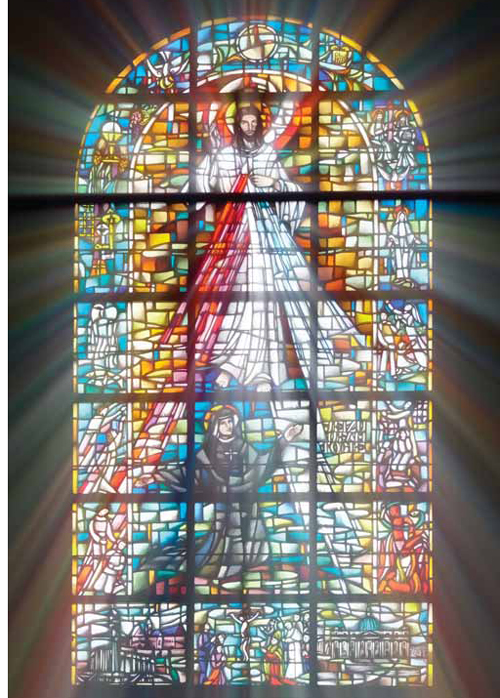
2017 The Church in Mississippi—Is It Relevant?
“Culture is the pond in which we swim and the lens through which we see the world.” Ed Stetzer
Competing voices, a myriad of worldviews, and strident discord characterize much of our daily information intake. The anger and divisions between highly opinionated Americans have produced a kind of toxicity that is painful. The battle lines are sharply drawn between those who believe in absolute truth and those who do not. Our culture, even here in the Bible Belt, feels a bit frayed around the edges.
Christians. Remember them? That group Jesus called to be salt and light and His representatives in a world that desperately needs His love, compassion, and message—are they relevant anymore? What’s next as they seek to deliver a timeless healing gospel to a chaotic world?
In this February issue—and February is, of course, the month when we celebrate that very broad word, “love”—we asked a few questions of eight outstanding members of the church here in Mississippi. What about the present and future for the Church in our changing and ever evolving secular culture?
Read their thoughts. Think hard. And we would love to hear from you. By the way, we were limited in space when it came to the entirety of our pastor’s responses. I encourage you to see the unedited edition of the cover story on our website at mschristianliving.com.
Our Questions:
- In what feels like a Post-Christian America, how can Believers best remain engaged in our politically correct hypersensitive world and respond appropriately when we are called “haters?” When the Bible speaks of “speaking the truth in love,” what does that look like in 2017?
- Has the mission of the church in our culture changed in this era of hot social issues, identity politics, and a decline in church membership? Do we need to do something different?
- What keeps you up at night and what gives you hope?
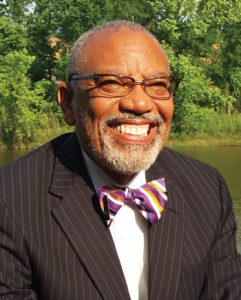
Neddie Winters
Former Pastor and President of Mission Mississippi
Neddie is a native Mississippian, born and raised in Tunica. He serves as President of Mission Mississippi, a movement in the Body of Christ to reconcile individuals across racial and denominational lines. He holds a B.S Degree from Alcorn State University, a master’s degree from the American University and has done further Biblical studies at Reformed Theological Seminary.
We should not be surprised that we are being called haters because we believe in what the Bible says. Jesus has warned us already that, “In the world you will have trials and tribulations. But be of good cheer, for I have overcome the world” (John 16:33). Specifically, he says to us in Matthew to pray for people who persecute you, love those who hate you and do good to those who do evil to you. We overcome evil by doing good—not by accommodating the evil.
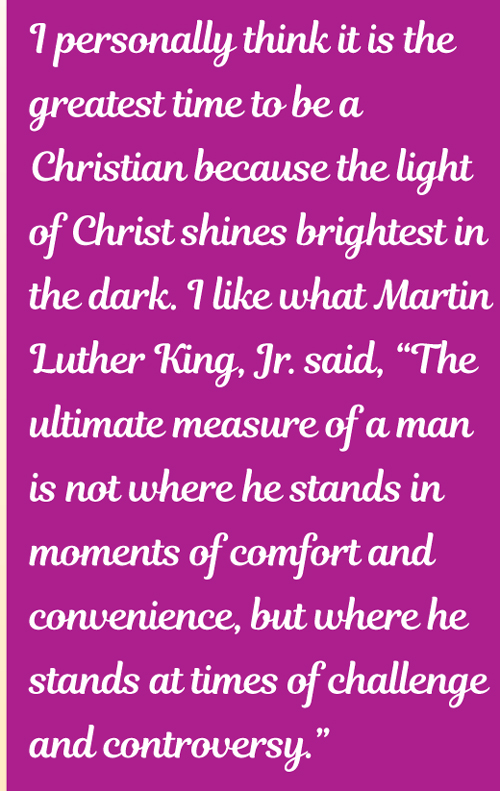 Part of what we find ourselves with in this society of being politically correct is that Christians also have gotten caught up in valuing being liked and accepted. That is a fantasy. The fact of our faith leaves no room for compromise with the world. I think we find ourselves in the place we are in today because we have tried to make peace with a world that is not going to be at peace with absolute truth. We have got to take the truth of God and evaluate our personal standards in society. In order to change the present culture, we, as Christians are going to have to practice what we preach. I know when we operate according to God’s truth we will be loving those who call us “haters.” Light dispels darkness.
Part of what we find ourselves with in this society of being politically correct is that Christians also have gotten caught up in valuing being liked and accepted. That is a fantasy. The fact of our faith leaves no room for compromise with the world. I think we find ourselves in the place we are in today because we have tried to make peace with a world that is not going to be at peace with absolute truth. We have got to take the truth of God and evaluate our personal standards in society. In order to change the present culture, we, as Christians are going to have to practice what we preach. I know when we operate according to God’s truth we will be loving those who call us “haters.” Light dispels darkness.
I personally think it is the greatest time to be a Christian because the light of Christ shines brightest in the dark. I like what Martin Luther King, Jr. said, “The ultimate measure of a man is not where he stands in moments of comfort and convenience, but where he stands at times of challenge and controversy.”
The message and the mission of Jesus never changes. Our strategies may change as the modern world changes. Technology, for instance, has opened up new avenues and new mediums to reach people. We need to be creative and make use of such gifts. We also need to be bold to speak the truth. I believe the world—even those who call us “haters”—is hungering to know the truth and to hold on to something that is not going to change three or four days from now with the next trend.
What keeps me up at night? Prayer. My hope is that I know God answers prayer, and I choose not to worry about things I can’t control. But I can control what I think about, and when I find myself awake at night, I pray. I take Paul’s advice that he gave to the Philippians. “Do not be anxious about anything, but in every situation, by prayer and petition, with thanksgiving, present your requests to God. And the peace of God, which transcends all understanding, will guard your hearts and your minds in Christ Jesus.”
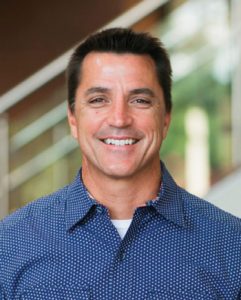
Dr. Chip Henderson
Senior Pastor Pinelake Church
Dr. Chip Henderson has served as the senior pastor and primary teacher at Pinelake Church since 1999. He is well known for his commitment to biblical, life application teaching. Chip’s passion is to see Christ bring about powerful life-change in people—stirring a spiritual movement that will change the world. Since Chip’s arrival, the church has grown from 700 to more than 10,000 attendees each week and has expanded to five campuses with extensive ministries that are impacting Mississippi and the world. He and his wife, Christy, have three children: Rachel, McKenzie, and Reagan.
You have to live your life and don’t worry about what other people are saying or thinking about you. You live your life for an audience of One. I believe that means you live in faith and you have a relationship with Christ and live your life in faith, in Christ, with sincerity and integrity before Him in faith. You aren’t talked out of your conviction; you aren’t talked out of your belief. You stand firm in the faith. But you also live in Love. Which means you demonstrate that your faith is real. In a world of haters, our goal is not to match hate with hate; anger with anger but to do what Jesus said and that is to return even insult with love and to be gracious and kind.
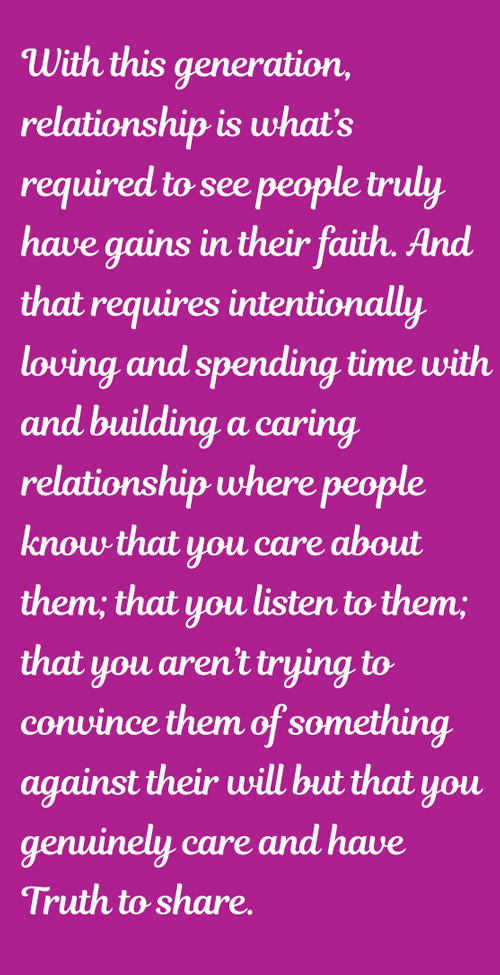 Speaking the truth in love, I think, depends on the context. I believe if you have a relationship with a person, speaking the truth in love is critical. The old saying, “people don’t care what you know until they know you care,” is true. I think what is important in this culture where people are easily offended is to be a person who lives with a heart of love. We have to love people and understand that God has to grace them as He graced you—not just share our opinion but show that our faith is real.
Speaking the truth in love, I think, depends on the context. I believe if you have a relationship with a person, speaking the truth in love is critical. The old saying, “people don’t care what you know until they know you care,” is true. I think what is important in this culture where people are easily offended is to be a person who lives with a heart of love. We have to love people and understand that God has to grace them as He graced you—not just share our opinion but show that our faith is real.
If you don’t have a relationship with a person then I think it’s important to show humility; to be gracious and kind. While you stand in Truth you are still gracious and kind even as you stand in your faith.
The mission of the church has not changed. The mission is still the same as it has been. In Matthew 28:18-20, Jesus called us to make disciples, to introduce people to the grace of Jesus, the gospel of Jesus, to baptize them in his name, to teach them what he has taught us in the name of the Father, the Son, and the Holy Spirit. So the mission of the church has not changed. BUT the goal of the church in any age is to communicate the unchanging truth to an ever-changing culture.
So our strategy in the midst of this culture where everyone is fighting and arguing and have their minds made up and you can’t tell me how to live has to be a change in our strategy. So yes, what we need to do does look differently. I think we have to trade what used to be “cold call” evangelism where you would just knock on a door. I’m not saying you don’t ever do this but just a visit and one-time conversation with someone who visited your church isn’t going to really bring the impact that God intends.
With this generation, relationship is what’s required to see people truly have gains in their faith. And that requires intentionally loving and spending time with and building a caring relationship where people know that you care about them; that you listen to them; that you aren’t trying to convince them of something against their will but that you genuinely care and have Truth to share. So relationship is key.
I say we need to be a people of integrity. We need to be using the thing we are trying to sell. We can’t tell people they need Jesus if we are not living a Jesus-centered life. And so I think more than anything about the strategy for us is that the reason Jesus was so appealing is that Jesus was so different—and in this culture I think the thing that will give our testimony, our mission to make disciples power, will be when our lives give proof of the power and love of Jesus in us.
As a disciple of Christ, you have to learn from Christ, but you have to live in Christ before you can lead others to Christ.
The truth is that I don’t have anything that really keeps me up at night worrying about the church. I believe Jesus promised to build His church and I know that He has been faithful to do that and I trust He will keep that promise. I don’t like the division that I often see in the “body of Christ” but I’m not worried about the Church.
So, I hold on to the promise of Christ. And that’s what gives me hope; That Jesus is faithful. The one who conquered sin and death and hell in a culture that was just as dark as ours is still on His throne and it gives me hope.
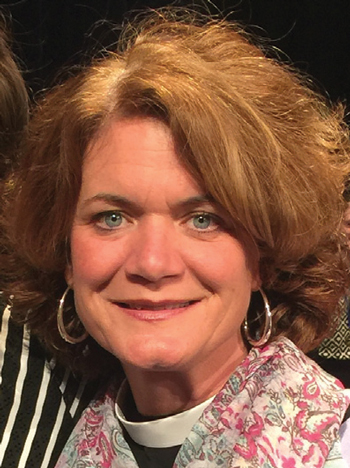
The Very Reverend Kyle Dice Seage
Rector of St. Philip’s Episcopal Church Jackson
The Very Rev. Kyle Dice Seage has been rector of St. Philip’s Episcopal Church in Jackson since 2010. She is a graduate of The University of the South in Sewanee, TN. She is also an alumna of the Episcopal Theological Seminary of the Southwest in Austin, TX.
Her passions are liturgy, music, and outreach ministry in the church and her mission is to exhibit the love of Christ in her actions and prayers. We live in a broken world, but her conviction is that we are all loved powerfully and without bounds by God and that we are and will be redeemed by Christ’s witness in the world. Kyle is the mother of two wonderful teenaged daughters, and wife to Brian Seage, who is the Bishop of the Episcopal Diocese of Mississippi.
My initial response to the question of “speaking the truth in love” was to recall a line in the song most learned in Sunday School as children: “And they’ll know we are Christians by our love.” All people of faith are called to exhibit love in their actions, and Christians are not exempt from this command. In the Episcopal Church, many congregations have adopted the hashtag phrase #allarewelcome, and, in fact, the phrase is hanging as a banner in the front of our church, so that all who drive by will know that this place is one of welcome.
In order to see Jesus, to know that love, Christians are called to watch, listen, and see how we treat one another. It’s not always easy to be truthful, and it’s certainly not always easy to love, but if we believe that we are all created in the image of God, we have to also believe that our behavior and our work represent our Christianity.
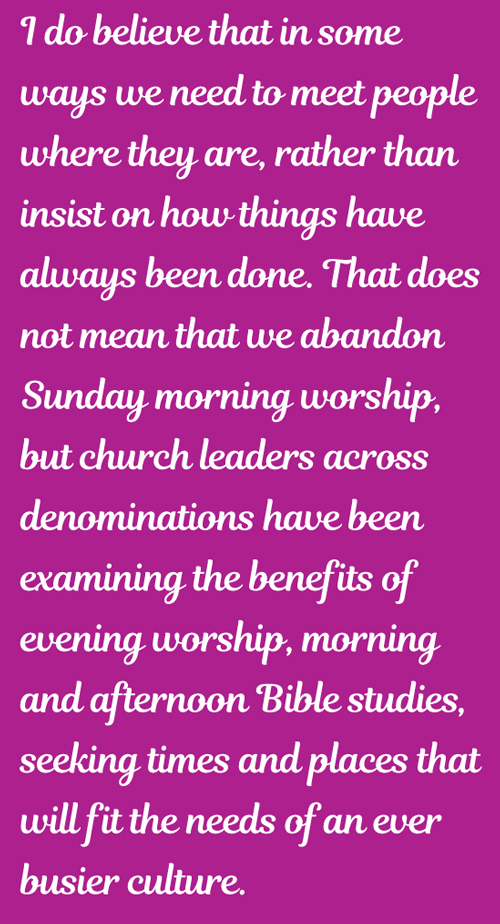 Jesus said, “Love the Lord your God with all your heart, all your soul, and all your mind” (Matthew 22:37). “And love your neighbor as yourself” (Mark 12:31). Our Presiding Bishop, The Most Reverend Michael Curry, has proclaimed a message of being The Jesus Movement in the Episcopal Church. Our actions, our truths, and our love should reflect the love that Jesus represented during his lifetime and gave over to us at his resurrection to continue to be his heart and his hands in the world about us.
Jesus said, “Love the Lord your God with all your heart, all your soul, and all your mind” (Matthew 22:37). “And love your neighbor as yourself” (Mark 12:31). Our Presiding Bishop, The Most Reverend Michael Curry, has proclaimed a message of being The Jesus Movement in the Episcopal Church. Our actions, our truths, and our love should reflect the love that Jesus represented during his lifetime and gave over to us at his resurrection to continue to be his heart and his hands in the world about us.
I do not believe that the mission of the Church has changed. Our Book of Common Prayer states that “the Mission of the Church is to restore all people to unity with God and each other in Christ—and that it pursues this mission as it prays and worships, proclaims the Gospel, and promotes justice, peace, and love.
My faith is dependent on the culture of the church remaining constant in my life. Studies have shown some of the declining membership is a reflection of our changing culture where regular attendance at worship is no longer primary in the lives of many.
I do believe that in some ways we need to meet people where they are, rather than insist on how things have always been done. That does not mean that we abandon Sunday morning worship, but church leaders across denominations have been examining the benefits of evening worship, morning and afternoon Bible studies, seeking times and places that will fit the needs of an ever busier culture.
In the same vein, however, I believe that many people crave tradition, liturgy, and community in corporate prayer with other believers. Many young people, from teenagers to millennials, want a spiritual connection to one another. It is no longer relevant for them to sit and listen and be told what to do, or what to believe. They want meaning, they want to find Jesus in the work they do in the community and many desperately want their priest or pastor to show them God and Jesus, not merely tell them about God and Jesus.
What keeps me up at night is my frustration and despair at not being able to help everyone who needs me. Being an ordained leader comes with a lot of expectations, many of which we place on ourselves, and many that are placed upon us by our congregations. As a person called to spend my life helping to show the love of Christ in the world, I want to help all who are lonely, downtrodden, forgotten or in need. I don’t have the time or resources to do it and that makes me sad.
Every single day that I am given in this world gives me hope. I am firmly convinced, by both scripture and experience, that everything that I have is a gift from God; and that nothing I have comes solely because of my efforts, but because of God and the Holy Spirit working in and through me.
I am who I am because of God first, and then because of the saints in this world who model Christ for me.
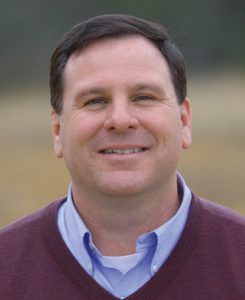
Reverend Joseph Wheat
Senior Pastor of Highlands Presbyterian Church Ridgeland
Joseph is a graduate of Auburn University and Reformed Theological Seminary. Joseph also received a Doctor of Divinity degree (honorary) from New Geneva Theological seminary in 2006 and has been the Senior Pastor at Highlands since 2005. He previously served as Senior Pastor of Village Seven Presbyterian Church in Colorado Springs, CO, and the Founding Pastor of Trinity Presbyterian Church in Tuscaloosa. He is married to the former Gina Smith and they are the parents of daughters Sarah Caitlin and Emily Grace.
It is helpful to realize that this is not the first time in history the church has found itself pressed by the culture. It was very politically incorrect to not worship the Roman Emperor and to reject the social norms of sexual promiscuity and the culture of death that marked the first century. The good news then and now is that humbly and consistently speaking the truth in love is most appreciated at the end of the day (though never by everyone).
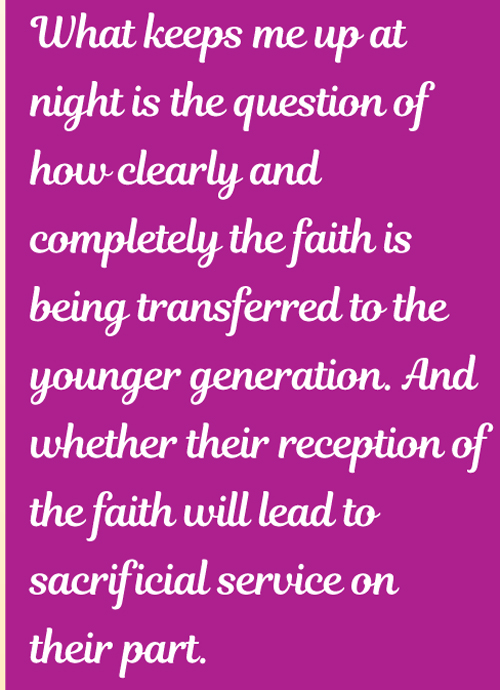 To me, it’s even more the combination of words and deeds of love and mercy that make the real difference. Christians must not be seen simply as a contrarian sub-group. We have a gospel with the real positive traction of grace and real hope. And when that is supported by a life of love, it’s very powerful.
To me, it’s even more the combination of words and deeds of love and mercy that make the real difference. Christians must not be seen simply as a contrarian sub-group. We have a gospel with the real positive traction of grace and real hope. And when that is supported by a life of love, it’s very powerful.
The role of the church remains the same. It’s simply time for the church to more thoroughly act out on what we believe. For instance, the church can bridge gaps between people that others cannot. The true Church has always been a unity of different peoples. Whether the issue is ethnicity, or class or cultures, the church has been able to transcend them.
I think we are more aware of the need for the church to lead in these matters, not follow the culture. Where others major in “divide and conquer,” we must major in “unite under Christ’s truth and grace.”
What keeps me up at night is the question of how clearly and completely the faith is being transferred to the younger generation. And whether their reception of the faith will lead to sacrificial service on their part.
The Barna Group’s polling on this is interesting and alarming. I don’t mean simply whether we are successfully trying to “identify with them.” I mean whether the ancient Faith is actually given, rather than a reduction of the Faith. This is also about outreach to a needy world. I believe the ability to reach out effectively through the next generations will depend so much on this. Along with that concern is the supposed “amoral” nature of the Internet and global communication. It assumes that everything has equal validity.
That is not the Christian position, however. Christianity always has and still claims revealed truth, which is the Bible. This doesn’t mean that we disagree with everything that comes from outside the church. Far from it. “We must not despise the truth, wherever it is found because, in the despising of it, we also despise the author of truth, Who is God,” (John Calvin). We must consistently apply the Scriptures to the messages that abound. And paint a picture of a better world. I am actually encouraged in the hunger for the Scriptures I see in the younger generations.
I also see things to cheer about! The re-emergence of a concern for ministries of mercy in the Church is truly beautiful. This reveals a personal desire for a tangible expression of God’s love. Jesus said, “The Kingdom of God is at hand (here now).” I see a generation rising that actually wants to believe that, and participate in it locally. I find myself learning from the younger people in our church in different ways, and that encourages me greatly.
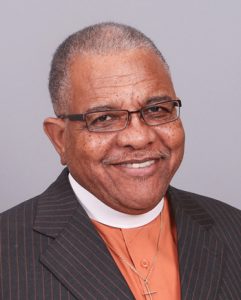
Bishop Ronnie Crudup
Founder and Senior Pastor of New Horizon Church International
Bishop Crudup earned his Bachelor of Science degree from Jackson State University, and he holds a Master of Divinity degree from Reformed Theological Seminary. Bishop Crudup has celebrated over 40 years of his life with First Lady Jacqueline Crudup. Together they have four grown children and eight young grandchildren. Bishop Crudup has seen his congregation multiply from 56 members in 1987 to over 3,000 members, 5 plus ministries, and a Bible school.
I agree that we are now living in a Post-Christian America and I think that part of what it’s going to take to actually move effectively in this new culture is that we recognize we are no longer where we were thirty or forty years ago. As one person told me there used to be a time when the church “owned” Sunday, but that is no longer the case. The NFL now owns Sunday.
I also think that Believers have to be sensitive with their language and their tone because too often we come off sounding in a way we did not intend. I tell people that as Christians in the church and everywhere else we have to be very welcoming. We don’t affirm anything the Bible doesn’t affirm, but we do want to be welcoming of all people. As we speak to people, we do speak the truth in love, but that truth doesn’t have to be in a tone that is hard and harsh. People don’t like to be preached to and so how we present our convictions and our truth is a critical point.
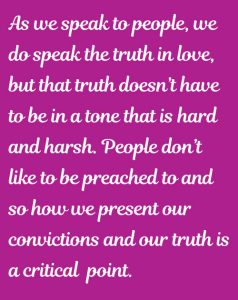 I take a Biblical Orthodox view of things, but at New Horizon all people are welcome—whether that means the LGBTQ community or anybody else for that matter. But we will only affirm lifestyles that the Bible affirms. We will not single out anyone, but when it comes to membership in the church or people who are going to be on the platform of the church, then we are going to expect them to operate by the tenets of the church. Just like any place else that has a membership, there are criteria that come with that.
I take a Biblical Orthodox view of things, but at New Horizon all people are welcome—whether that means the LGBTQ community or anybody else for that matter. But we will only affirm lifestyles that the Bible affirms. We will not single out anyone, but when it comes to membership in the church or people who are going to be on the platform of the church, then we are going to expect them to operate by the tenets of the church. Just like any place else that has a membership, there are criteria that come with that.
In America, people have choices about whether or not they are going to abide by the Biblical view of things. I find that in talking to people I try to stay away from the subjective but go back to the objective point that we take a Biblical worldview and we will operate by those principles. At the same time, our doors are open to all people. We see every stripe of people within a month in our services. There is a way that you can say things truthfully and kindly in this culture. But we have to understand where we are and how we are perceived by the culture that does not know Christ.
The mission of the church should never change. Our methods are adaptable and flexible. The mission of the church in dealing with light and darkness has never been clearer. I think though if we are going to engage the open culture, we are going to have to adapt. If a church is going to confront and interact then that church needs to learn to speak the language of what is going on today.
Scripture tells us we are in the world but not of it. For example, Daniel had no problem with the language of Babylon or the education in Babylon. He just decided he would not eat the meat or drink the wine of Babylon. He kept a certain separation so that he did not lose himself to the culture. That is what we in the church need to call our people to. That is the example of being salt and light in the darkness. The people in the world desperately need what we have.
What keeps me up at night is my concern about the children of the church. We are losing a lot of young adults who are falling away from what we call “organized religion.” They are our children who have “drunk the wine of Babylon.” I believe the church has to intentionally find ways to compete with the affection the world offers our children.
I am most hopeful that the church is looking for the opportunity to show how relevant we are. I believe that the problems in our culture are God’s opportunity and I think that we have the answers. The world is struggling with hopelessness, and I believe the Lord is setting this up in the midst of the crisis that we will see a revival like never before.
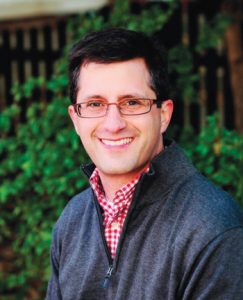
Reverend Eddie Rester
Senior Pastor of Oxford-University United Methodist Church
Eddie Rester has served as pastor to Oxford-University UMC since July 2014. Prior to that, he served as pastor at Parkway Heights UMC in Hattiesburg, MS. He received his BA from Ole Miss, his M.Div from Duke University and his D.Min. from George Fox University. He has a great passion for seeing the church reach the emerging culture. He and his wife Audra have two teenage daughters, Sydney and Ann Claire.
This is definitely a post-Christian America. And in truth, it has been post-Christian for some time. While Christians often fear this loss of power, influence, and prestige, it is a hopeful turn—because it is a return to our pre-Constantinian roots. The greatest growth of the church occurred in the first centuries before Constantine made Christianity the official religion of the state.
 Jesus says that our task, our calling, is to love God and love people. To follow him means we must learn to err on the side of grace. It’s time to set aside the battle-axes and baseball bats masquerading as “truth” and love the people in our towns and communities.
Jesus says that our task, our calling, is to love God and love people. To follow him means we must learn to err on the side of grace. It’s time to set aside the battle-axes and baseball bats masquerading as “truth” and love the people in our towns and communities.
The mission of the church is simply to make disciples of Jesus Christ. How the body of Christ has done that has always morphed and changed through the centuries.
Our biggest stumbling block to mission has been the church. The world knows very clearly what we’re against. What the world doesn’t know is what we’re for. Jesus, though, is clear that we are to be for others and for our community.
What if every church decided that they wouldn’t just be churches IN a neighborhood, but they would be passionately FOR their neighborhood? What if we made it our mission to reveal the love and grace of Christ to the world through our actions, through our support of people we agree with and disagree with?
Over the past few decades, the world outside the church has seen our politics and our power mongering. It’s time for us to show our towns and schools and neighborhoods the love of Christ.
There’s a new generation that loves to serve the world in the name of Christ. They’re not going to put up with power struggles. They want to serve the world and see the world changed by the love and grace of Christ. That gives me hope. If the church can get out of their way, we have a future.
What keeps me up at night? The anger and maliciousness of Christians acting in the name of Christ. Every angry Facebook post. Every anti-something boycott or piece of anti-something legislation makes our task of making disciples that much more difficult. Sometimes I just want to say to some Christians, “Just stop.”
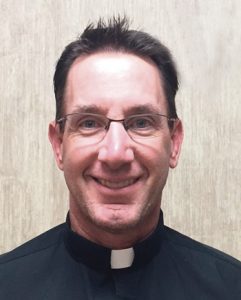
Father John Bohn
Pastor of St. Richard Catholic Church Jackson
Father John Bohn is a native of Nebraska, a lifelong Catholic, educated in Catholic schools. He served four years active duty in the US Army after high school graduation. He received a journalism degree from the University of Nebraska-Lincoln. He was ordained a priest for the Catholic Diocese of Jackson in 1997. He has served assignments in Jackson, Greenville, Clarksdale, and Starkville and has served St. Richard Church since 2015.
I don’t think “speaking the truth in love” looks any different today than it has in the past. What has changed is the climate in which we are speaking. For many decades, Christian Americans enjoyed living within a broader culture that was very accepting of and rooted in traditional Christian teaching. However, over the past 40 years or so, many things have occurred within American culture that have both eroded people’s confidence in Christianity and “thrown into question” the basic tenants of our faith.
First, there have been widely reported religious scandals, specifically in my Catholic Church. For example, the pedophilia scandals of the early 2000s significantly shook people’s confidence in the Catholic Church as the “visible” Body of Christ on earth.
Next, the vast amount of information that people now have access to through the Internet and other forms of media has expanded the amount of ideas people have about God, religion, spirituality, etc. This information has, like never before, inspired many people to question (and doubt) the nature and even the existence of God.
Finally, we see a continued “liberalization” of the broader culture that began in earnest in the 1960s and continues to this day. Issues such as divorce, premarital sex, drug use, homosexuality, etc. are today viewed by many people from a much different moral and religious perspective than they were when I was a child in the 1960s and 1970s.
Because of these many changes, more and more Americans are identifying as “atheist” or “agnostic.” And of those still identifying as Christian, even their understanding and acceptance of some specific “traditional” Christian beliefs and teachings has changed. Therefore, Christians need to expect more resistance from the broader public when speaking about specific religious topics, and when even speaking about God and religion itself.
So, what will speaking the truth in love look like in 2017? Let me answer that by quoting Paul VI, our Catholic Pope from 1963 to 1978. He once wrote that, “Modern man listens more willingly to witnesses rather than teachers, and if he does listen to teachers, it is because they are witnesses.”
Simply put, modern Americans are quick to pick up on hypocrisy. Therefore, if a “preacher” or “priest” or “Christian” wants to “speak the truth with love,” he or she is best to begin by authentically living the faith. Anyone, even the devil, can quote chapter and verse from the Bible. (Satan did it when he tempted Christ in the desert.)
However, what this country needs more than ever is Christian witnesses, Christians who speak with their actions, who live consistently Christian lives, both when convenient and inconvenient, and who embody Christ’s two great commandments of Love of God and Love of Neighbor.
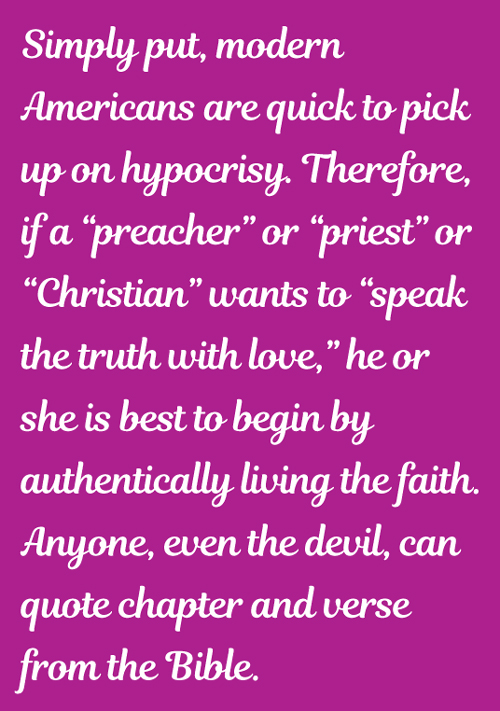 The mission of the Church has not changed since Christ founded the Church 2,000 years ago. The mission of the Church has been and always will be singular in nature, and that is “the salvation of souls.” This is not the only time in human history that the Church has existed in a world of hot social issues, identity politics, and declining membership. If anyone knows anything about the history of Christianity, they will realize that we have known worse times and we have known better times.
The mission of the Church has not changed since Christ founded the Church 2,000 years ago. The mission of the Church has been and always will be singular in nature, and that is “the salvation of souls.” This is not the only time in human history that the Church has existed in a world of hot social issues, identity politics, and declining membership. If anyone knows anything about the history of Christianity, they will realize that we have known worse times and we have known better times.
Do we need to do anything different considering the current, contentious social and political environment we find ourselves in? The Church always needs to adapt and adjust the way in which we convey our message without changing the message.
Americans are techno-savvy today. The Church needs to recognize that and utilize those resources without diluting, minimizing, or eliminating the core components of our faith, our prayer, our worship or our service to the poor. After all, Christianity is relational. It comes alive for us when we are in relationship with other living, breathing human beings.
Sadly, we are increasingly living in a virtual world where our face-to-face contact with others is being lessened because of advances in technology (cell phones, Skype, Instagram, etc.). The Church needs to do all it can to reverse this trend.
I am convinced that the number one reason people are increasingly divided and agitated today is because we are spending too much time alone with our devices, flooding our heads with too much politics and too much talk about what is wrong with our country and who’s to blame.
To combat that, I believe the Church needs to create, promote, and sustain an environment where people can come together in the name of Christ and get to know one another as we really are, not liberal or conservative, not rich or poor, not educated or uneducated, but just as beings made “in God’s image and likeness.”
Humans are built for relationships. We’re built for love. We are not built to be alone with our phones. The more the Church can do to bring us together physically as well as spiritually and emotionally, the more I believe the Church will succeed in our mission of saving souls.
What keeps me up at night is cats fighting outside my bedroom window. Seriously, on nights that I cannot sleep, I am usually preoccupied with what I can do as a pastor to be more effective for my congregation.
Currently at St. Richard Church we have a big building project going on; we are without an associate pastor; we have an elementary school and we have shifting demographics in the city of Jackson in which many people are opting to move to Madison or Rankin County. Daily I do my best to turn all of these concerns over to Christ, but the human side of me cannot help but worry sometimes about the day-to-day life of this parish.
What gives me hope is the promise of Christ that He will be with us until the end of time. I believe that if we Christians do our part in opening ourselves in faith to Jesus Christ and that we live His gospel as faithfully as we can, Christ will sustain us regardless of what happens. My hope in is Christ. It really always has been. I pray that it always will be.
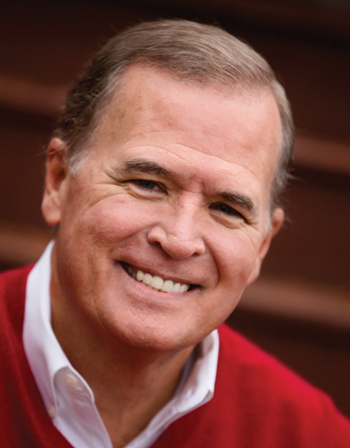
Dr. Dean Register
Senior Pastor of Crosspoint Church Hattiesburg
Dean Register is a passionate and relevant communicator of the Gospel and is a frequent speaker at conventions and conferences around the nation. He is founding pastor of the wide-awake Crosspoint Church in Hattiesburg MS. He holds four degrees including a Doctor of Theology degree from New Orleans Baptist Theological Seminary. He was twice elected President of the Mississippi Baptist Convention and served as an Adjunct Professor for New Orleans Baptist Theological Seminary and Beeson Divinity School in Birmingham, AL. Dr. Register is a die-hard Atlanta Braves fan and he refers to himself as a migrant Southerner. He was born in Florida, grew up in Georgia, and calls Mississippi home.
I’m convinced that believers must remain actively engaged in our culture in order that we might be salt and light for Christ through our words and deeds. (Matthew 5:13-14). We are challenged scripturally to always be ready to share our faith in a gentle and respectful manner. (1 Peter 3:15)
Obviously, there will always be antagonists who erroneously call us haters. Such antagonists may affect us emotionally, but they should not direct us missionally. I find it significant that truth necessarily contains a measure of intolerance. In the field of chemistry, the periodic table of elements is not insignificant preferences. If you tolerate drinking H2SO4 instead of H2O, you will suffer a painful consequence and possible death.
Jesus’ truth has always been narrow. He said, “Straight is the gate and narrow is the way that leads to life.” (Matthew 7:14) Therefore to “speak the truth with love” (Ephesians 4:15) means that we must exercise courage to express biblical truth with godly compassion and tenderness.
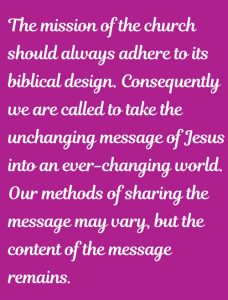 The mission of the church should always adhere to its biblical design. Consequently, we are called to take the unchanging message of Jesus into an ever-changing world. Our methods of sharing the message may vary, but the content of the message remains. (1 Corinthians 15:1-4)
The mission of the church should always adhere to its biblical design. Consequently, we are called to take the unchanging message of Jesus into an ever-changing world. Our methods of sharing the message may vary, but the content of the message remains. (1 Corinthians 15:1-4)
I grew up in a traditional church. As a teenager, I could predict what would happen and when it would happen. My critique was that there was a difference between healthy biblical tradition and unhealthy trivial traditionalism. Years later I discovered that Yale University historian, Jeroslav Pelikan, felt a similar disconnect when he explained that “tradition is the living faith of those now dead but traditionalism is the dead faith of those now living.” Ouch!
I grieve that too often church members become locked into their selfish traditionalism and subsequently fail to model the Great Commandment (Matthew 22:36-38) and the Great Commission. (Matthew 28:18-20)
Hope springs eternal within me because Jesus conquered sin and death. That doesn’t mean I don’t have burdensome nights and hard days. Some of the best counsel I received was from a missionary when I was a college student preparing for the ministry. He said, “Young man, if you love and serve Jesus wholeheartedly, you’ll be scared to death half the time and delirious with joy the other half, but you’ll never have any regrets.”
He was right. After four decades of ministry, I confess I’ve been scared to death at times when my biblical convictions put me in the crosshairs of conflict and controversy. But I also rejoice to confess that I‘ve been delirious with joy in the outrageous grace of Christ. Indeed, I’ve never had any regrets!
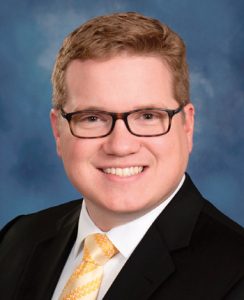
Pastor Matt Powell
Senior Pastor First Baptist Church Tupelo
Matt and his wife Andrea, along with their three children (plus one on the way) reside in Tupelo. Matt has the wonderful privilege of serving as Senior Pastor of Tupelo’s First Baptist Church. In his 13 years of ministry, Matt has also served in other parts of Mississippi as well as Tennessee. His desire is to help others uncover the amazing love of God to empower them to live everyday life. He is fully persuaded that God is always working in the details and will finish everything He begins.
One of the most politically charged accusations over the past decade was that America is a Post-Christian nation. There were politicians on both sides of this accusation; some saying that America was past her “Christian-nation” prime, and others attesting that Christianity in America is the immovable rock on which she was founded.
Regardless of which view you are most inclined to believe, I believe most have accepted that Christian influence on public thought is not what it once was even from just a few years ago. Therefore, given that we are indeed living in what feels like Post-Christian America, we will need to be “as wise as serpents, but as innocent as doves” (Matthew 10:16) in trying to navigate through everyday conversations with all kinds of individuals and remain faithful to the eternal truths of the Bible.
First, we need to ask ourselves if there is merit to the accusation that Christians are “haters.” As a Christian, I would just love to say it is an egregious exaggeration to suggest that any groups of Christians are “haters.” History, both near and far, along with fresh demonstrations of Christian hate in our own day, is found without a whole lot of digging. Hatreds such as racial prejudice have been present in Christian circles for generations.
While I would be quick to point out that those beliefs are present as a result of the sinful human element of Christian religion rather than through Divine Word, it does not change the fact that hatred is not foreign to Christianity. Given this is the case, when we as Christians are accused to be “haters,” it might serve us well to pause with some self-reflection before we just protest with cries of foul play.
Christian brothers and sisters from history greater than us have struggled with hate. Let’s not be too righteous to accept that in any given moment the sin of hate may be hiding in some corner recess of our hearts.
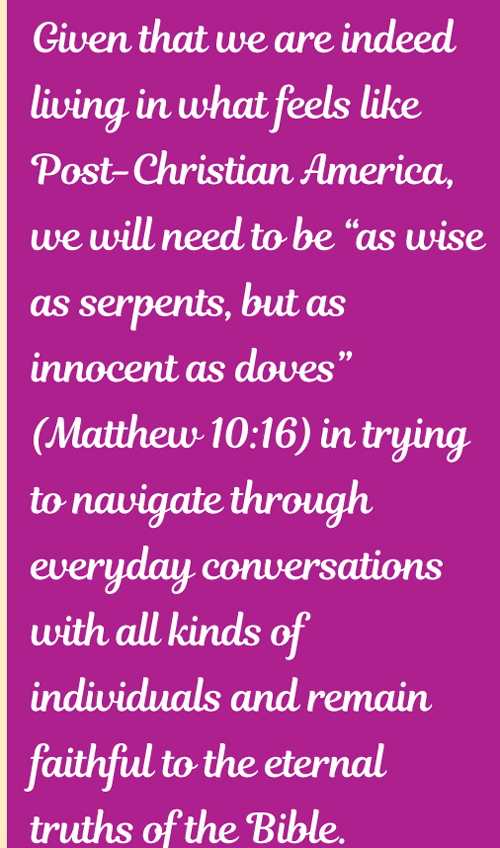 Second, we need to be encouraged because the Bible was written for a generation of believers such as ours. Jesus told us not to be surprised when the world hates us; he reminds us that it hated him first. (John 15:18) Let that sink in. The most loving, caring, patient, understanding, sympathetic, and empathetic person to ever walk the soils of earth was accused of being a devil. Therefore, we are in good company when we are criticized, even if we are unfairly criticized.
Second, we need to be encouraged because the Bible was written for a generation of believers such as ours. Jesus told us not to be surprised when the world hates us; he reminds us that it hated him first. (John 15:18) Let that sink in. The most loving, caring, patient, understanding, sympathetic, and empathetic person to ever walk the soils of earth was accused of being a devil. Therefore, we are in good company when we are criticized, even if we are unfairly criticized.
Third, we are to speak the truths of the Bible—not as judges but as fellow humans. As Christians, we are in no position to judge the heart of anyone. Only God alone is right to judge the hearts of human beings. When we attempt to judge the hearts of others, we only condemn ourselves. (Romans 2:1-2)
While we are not qualified to speak as a judge, we can speak what the Bible clearly states. Just remember before you do, God’s Word will be effective whether we are allowed to speak it or it is forcibly silenced from our mouths. I just remind myself that God’s Word is always intended to draw people to Him (2 Peter 3:9) rather than push them away from Him (even though sometimes this happens). By reminding myself of the intention of the Lord’s good Word, I can share His Word through His kindness. (Romans 2:4) Sometimes I do this better than I do on other occasions, but I just remember I am not trying to win an argument, rather I am to represent a Savior.
The mission of the Church has not changed because the message, target audience, means, and heart of the Gospel have not changed. Society has changed, but the differences do not lie in the Gospel message or the church’s mission; rather our social context has changed and will continue to change.
We would be wise to note that due to changing social conditions we must be intentional and careful in our communication of the Gospel. We must speak the Gospel in a tone that modern generations are readily able to hear. We cannot take away the possibility that the Bible may offend someone, but we should be guarded that we are not unnecessarily offensive to our neighbors.
While I am extremely hopeful for the church in America long term, I am concerned that the short term will produce much heartbreak. As a father of four and the pastor of a church, I am concerned for those close to me over the trials they indeed may face in the coming days. I believe the church will continue to see a decline in perceived influence. At the same time, a church with no influence to lose has everything to gain. Regardless of the future, this time will be used by our Heavenly Father to accomplish His good beyond our wildest imaginations.
Until that time comes, I leave you with a quote from the late southern author Flannery O’Conner, “Push back against the age as hard as it pushes against you. What people don’t realize is how much religion costs. They think faith is a big electric blanket when of course it is the cross.”

